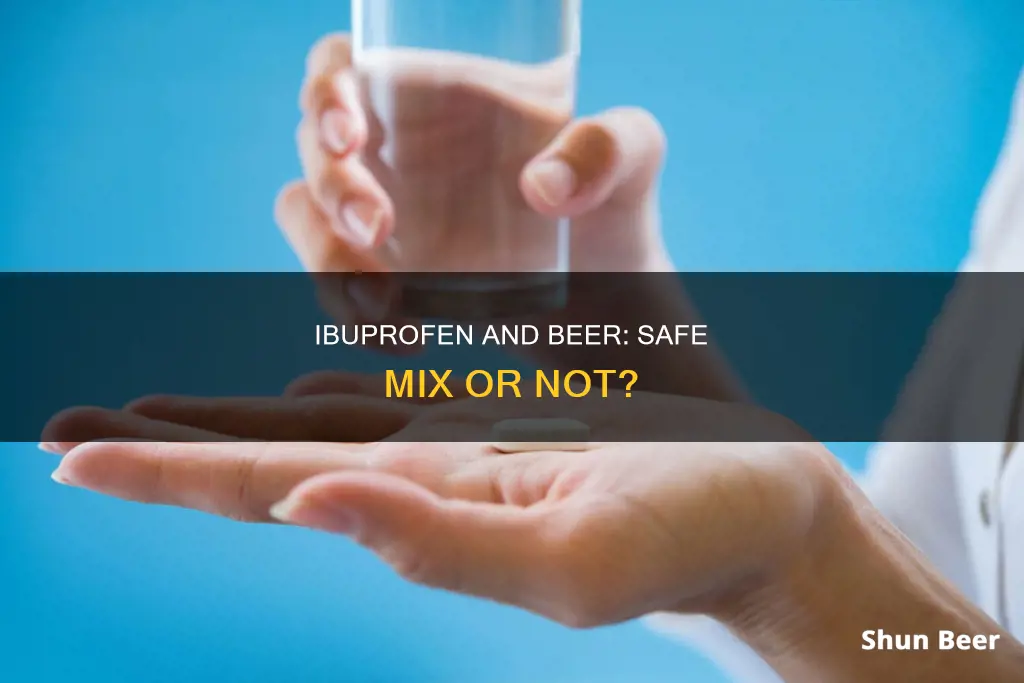
Drinking alcohol and taking medication is always a potentially dangerous combination. Even a small amount of alcohol after taking ibuprofen is risky, and the more you drink, the higher the risks. While consuming a small amount of alcohol while taking ibuprofen is considered generally safe, it is extremely important to be careful when doing so and to avoid it when possible.
| Characteristics | Values |
|---|---|
| Is it safe to take ibuprofen after drinking a beer? | Taking a recommended dose of ibuprofen with alcohol occasionally is typically not a cause for concern. However, doing so regularly can be harmful to your stomach and kidneys. |
| What are the risks of mixing ibuprofen and alcohol? | The combination can irritate the stomach and intestine lining, increasing the risk of ulcers and gastrointestinal bleeding. It can also cause drowsiness and affect kidney function. |
| How long after drinking alcohol can you take ibuprofen? | It is recommended to wait for at least 10 hours after drinking alcohol before taking ibuprofen, as alcohol can stay in your system for about 24 hours. |
| How much alcohol can be consumed with ibuprofen? | Consuming a small amount of alcohol while taking ibuprofen is generally considered safe. However, moderate to excessive quantities of alcohol can increase the side effects of ibuprofen. |
| Precautions | It is advisable to consult a doctor or pharmacist before consuming alcohol with ibuprofen, especially for individuals with certain health conditions such as liver or kidney problems. |
What You'll Learn

The dangers of mixing ibuprofen and alcohol
Ibuprofen is a nonsteroidal anti-inflammatory drug (NSAID) that is used to relieve pain, swelling, and fever. It is available over the counter under brand names such as Advil, Motrin, and Midol. While taking ibuprofen with alcohol occasionally is typically not a cause for concern, doing so regularly can have adverse effects on your stomach and kidneys.
Gastrointestinal Bleeding
A study of 1,224 participants showed that regular ibuprofen use raised the risk of gastrointestinal bleeding in people who consumed alcohol. People who drank alcohol but only used ibuprofen occasionally did not have this increased risk. Signs of gastrointestinal bleeding include ongoing stomach pain, tar-like stools, and blood in your vomit.
Kidney Damage
Long-term use of alcohol is known to damage kidney function, and long-term use of ibuprofen can do the same. Taking them together greatly increases the risk and severity of kidney damage. Signs of kidney damage include drowsiness, swelling of the hands and feet, and shortness of breath.
Lack of Alertness
Both ibuprofen and alcohol can cause relaxation and drowsiness. When combined, these substances can lead to increased sleepiness, impaired coordination, slowed reaction times, and confusion. This can result in an increased risk of accidents or unintentional harm to oneself or others.
Less Effective Medication
Mixing ibuprofen with alcohol can make the medication less effective while also intensifying its side effects. Alcohol can interfere with some drugs, including ibuprofen, making them less effective and increasing the likelihood of adverse reactions.
In summary, while occasional use of ibuprofen with alcohol may be considered safe, regular use can lead to serious health risks. It is important to follow the recommended dosage instructions on the packaging and consult a doctor or pharmacist if you have any concerns or health conditions.
Beer and Wine: Tips for Drinking Without Getting Sick
You may want to see also

How long after drinking alcohol can you take ibuprofen?
Ibuprofen is a nonsteroidal anti-inflammatory drug (NSAID) that is used to relieve pain, swelling, and fever. It is available over the counter under brand names such as Advil, Motrin, and Midol. While it is generally safe to take ibuprofen with a small amount of alcohol, mixing the two substances can have adverse effects.
Ibuprofen can irritate the stomach and digestive tract, and alcohol can increase this risk. Consuming alcohol with ibuprofen can lead to gastrointestinal bleeding and an increased risk of ulcers. This risk is heightened for those who take ibuprofen regularly or in high doses. Additionally, ibuprofen can affect kidney function, and when combined with alcohol, which can cause dehydration, the risk of kidney problems is further increased.
To avoid these risks, it is recommended to wait at least 10 hours after taking ibuprofen before consuming alcohol, as it takes about 10 hours for ibuprofen to clear from the body. On the other hand, it is suggested to wait at least 24 hours after drinking alcohol before taking ibuprofen, as alcohol can remain in the system for about 25 hours. This duration may be longer for certain individuals, such as women, people over 65, those with liver disease, or people of certain ethnicities like Asian descent.
It is important to follow the recommended dosage and duration of ibuprofen usage and consult a doctor or pharmacist if you have any concerns or specific risk factors.
Beer and Zolpidem: Safe Mix or Health Risk?
You may want to see also

How long is ibuprofen in your system?
Ibuprofen is a non-steroidal anti-inflammatory drug (NSAID) that treats inflammation, pain, and fever. It is not physically addictive, but users can become psychologically addicted.
Ibuprofen has a short half-life of 1.8 to 2.2 hours, meaning it is eliminated from the body in about 10 hours. However, the timeline for Ibuprofen being eliminated from your system depends on the time since your last dose, the potency of your last dose, and the frequency of your dosing.
Ibuprofen is eliminated by your metabolism, meaning that your body transforms ibuprofen into inactive products. Your liver is responsible for the metabolism of ibuprofen. The inactive metabolites are then excreted in urine.
Repeated doses of ibuprofen can lead to a steady state of drug concentration in the system, providing consistent beneficial effects in reducing pain, inflammation, and fever, but also exposing one to an ongoing adverse effect potential.
Liver disease and the ability to metabolize ibuprofen can affect how long it lasts in the system before being eliminated. Kidney disease can prolong the time its metabolites last before being excreted.
Ibuprofen is not a drug of abuse, so it is not tested for in drug test screenings.
Lip Piercing and Beer: What You Need to Know
You may want to see also

What is considered a small amount of alcohol?
While it is generally safe to consume a small amount of alcohol while taking ibuprofen, it is important to exercise caution and avoid mixing the two substances whenever possible.
The World Health Organization (WHO) has stated that there is no safe amount of alcohol consumption when it comes to health risks. Even small amounts of alcohol can increase the risk of certain cancers, such as bowel and female breast cancer. However, other studies have suggested that light drinking, defined as one to four drinks per week, may be associated with a slightly lower risk of death compared to abstaining from alcohol completely.
In the context of taking ibuprofen, consuming a small amount of alcohol is typically not harmful. However, it is important to note that ibuprofen can irritate the stomach lining, and alcohol can have a similar effect. Therefore, mixing the two may increase the risk of gastrointestinal bleeding and stomach problems. Additionally, both ibuprofen and alcohol can cause kidney damage, and combining them can significantly increase the risk and severity of kidney issues.
To ensure safety, it is recommended to consult a doctor or pharmacist before consuming alcohol with ibuprofen, especially for individuals with existing health conditions. While occasional use of ibuprofen with alcohol may not be a cause for concern, regular use can have negative effects on the body.
Beer and Promethazine: Safe Mix or Health Risk?
You may want to see also

What are the side effects of mixing ibuprofen and alcohol?
Mixing ibuprofen and alcohol can lead to several side effects, ranging from mild to severe. While consuming a small amount of alcohol while taking ibuprofen is generally considered safe, it is important to exercise caution and avoid it when possible. Here are some of the potential side effects of mixing ibuprofen and alcohol:
Gastrointestinal Bleeding
Gastrointestinal (GI) bleeding is one of the most serious side effects associated with mixing ibuprofen and alcohol. Ibuprofen can irritate the digestive tract, and long-term use or high doses may increase the risk of gastric ulcers or bleeding. Alcohol also irritates the stomach and digestive tract, and combining it with ibuprofen further increases the risk of ulcers and bleeding. Signs of gastrointestinal bleeding include ongoing stomach pain, tar-like or black stools, and vomiting blood or vomit that resembles coffee grounds.
Kidney Damage
Long-term use of both alcohol and ibuprofen is known to damage kidney function. Taking them together significantly increases the risk and severity of kidney damage. Signs of kidney damage may include swelling of the hands and feet, shortness of breath, and changes in urination. People with existing kidney problems should be especially cautious and consult a doctor before taking ibuprofen with alcohol.
Decreased Alertness and Impaired Coordination
Both alcohol and ibuprofen can cause drowsiness and decreased alertness. When combined, these substances may lead to excessive sleepiness, confusion, impaired coordination, slowed reaction times, and slurred speech. This can increase the risk of accidents or unintentional harm to oneself or others.
Reduced Effectiveness of Medication
Mixing ibuprofen with alcohol can make the medication less effective while simultaneously worsening its side effects. This means that ibuprofen may not work as well in relieving pain, and the negative side effects may be amplified.
Heart Problems
Ibuprofen, especially at higher doses, and heavy or regular alcohol consumption can contribute to heart-related problems. Combining the two may increase the risk of heart attacks or other cardiovascular issues.
Liver Problems
While ibuprofen is generally not hard on the liver, studies suggest that when combined with alcohol, it may increase the risk of liver damage. Alcohol is known to cause liver damage, especially with heavy or chronic consumption.
It is important to note that the risk of experiencing these side effects is higher for individuals who take ibuprofen regularly and those who drink heavily. Older adults and individuals with certain health conditions may also be at a higher risk for complications. Therefore, it is always advisable to consult a doctor or pharmacist before mixing ibuprofen and alcohol to understand your specific risk factors.
Alcohol and Sertraline: What You Need to Know
You may want to see also
Frequently asked questions
It is generally considered safe to consume a small amount of alcohol while taking ibuprofen. However, mixing the two can irritate the stomach and digestive tract, increasing the risk of ulcers and bleeding. It is recommended to avoid drinking alcohol while taking any pain reliever, including ibuprofen, if possible.
Mixing ibuprofen and alcohol can lead to an increased risk of gastrointestinal bleeding, kidney damage, and liver problems. Additionally, alcohol may worsen or increase the side effects of ibuprofen, such as drowsiness, dizziness, and blurred vision.
It is recommended to wait at least 24 hours after drinking alcohol before taking ibuprofen, as alcohol can stay in your system for about 24 hours. This waiting period helps to ensure that the alcohol has cleared your system before introducing ibuprofen.







